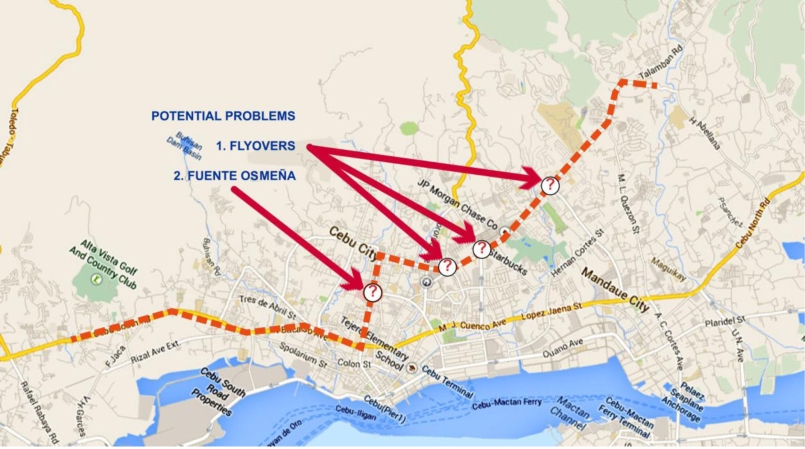Instead of disturbing historic Fuente Osmeña and Osmeña Boulevard or using flyovers, why not set another route for Cebu City’s plan for a Bus Rapid Transit (BRT)?
An alternative route was proposed by private citizens in the Movement for a Livable Cebu (MLC) as they questioned the environmental impact assessment report of the Department of Transportation and Communications that said 2,010 trees, mostly Narra, would be affected by the project.
“(We ask) again if it’s necessary to do this. We won’t object if there’s no other better alternative available. But our urban planners pointed out that there is indeed a better alternative,” MLC head convenor Marc Canton said in a press statement.
The MLC wrote Cebu City Mayor Michael Rama last July 7 asking for a dialogue with BRT planners to discuss their proposal for an alternative route for the BRT.
They said the current BRT route, which will use the center island of Osmeña Boulevard for dedicated bus lanes and passenger terminals, will pass through parts of the city with low population density and block about 30 percent of the road around Fuente Osmeña, causing traffic buildup and congestion on Gen. Maxilom Avenue.
The original BRT route will also force buses to use three flyovers including the BanTal flyover at peak traffic hours, causing more constriction.
The proposed alternative route starts from Bulacao, Pardo to P. Del Rosario, to Imus and MJ Cuenco, to MC Briones, ML Quezon and Talamban.
The MLC also suggested removing the flyovers and replacing them with flared intersections followed by road widening.
Population density
They said the alternative route will pass through high population density areas and stops at or near major institutions, schools and universities like Cebu Institute of Technology, Abellana National School, Cebu Normal University, University of San Carlos, University of Cebu, and University of the Visayas as well as the Social Security System (SSS) office.
“This better route will: (1) preserve the historic value of Osmeña Boulevard and Fuente Osmeña, (2) serve the high population density routes and the average commuter, (3) cause less traffic conflicts, (4) make it more feasible for the investors to operate and, (5) save a great number of trees,” the group said.
The P10.6 billion BRT project is expected to be operational by 2017 as a high priority national project.
“We want to make the BRT succeed,” said the letter signed by 25 members, including Dean Joseph Michael Espina of the University of San Carlos College of Fine Arts and Architecture, former dean Omar Maxwell Espina and architect Maria Lourdes Onozawa.
Detailed engineering studies are expected to start early next year, and willl take eight months to complete.
The original BRT route will run from barangay Bulacao in the south to barangay Talamban in north Cebu City.
It will pass through the intersections of Osmeña Blvd/Colon St., V. RamaAve./ M. Velez St., MJ Cuenco Ave./J Luna Ave., and Gorordo Ave./SalinasDrive.
MLC waged a successful campaign to suspend the construction of flyovers in Cebu City in 2011.
Sought for comment, Mayor Rama said there should be a balance between development and preserving trees to “serve more lives.”
“Trees should not also be the primary (concern) that development can’t happen. Therefore, there is such a thing as balancing,” Rama said.
The mayor, however, assured that there won’t be indiscriminate cutting of trees.
“There are always means like trimming, pruning. I’m not alien to this because I grew up planting grapes and vegetables,” Rama said.
The mayor also said Citom head Raffy Yap will oversee the BRT project and eventually will have to leave his traffic post. “I already told him to prepare for being the head of BRT. Raffy’s heart has always been fighting for the BRT. He has the intelligence and technical understanding of it.”
Related Stories:
Cebu City to earthball 2,024 trees affected by BRT routes
Better BRT route


